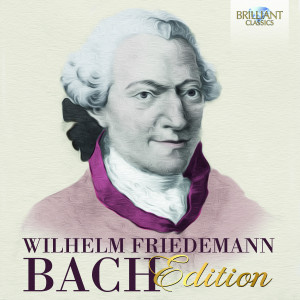Wilhelm Friedemann Bach
Story
Admirers of Wilhelm Friedemann Bach consider him in many ways the most original and interesting of the composer-sons of the great Johann Sebastian. His music fell generally into the transitional period between Baroque and Classical styles, but it was distinctive and personal.
Naturally, he was taught by his father, who also sent him to study violin with J.G. Graun and saw to it that W.F. Bach’s great successes in general education at Leipzig’s Thomasschule and the University of Leipzig (where he studied philosophy, law, and mathematics) did not interfere with his music. After graduation he worked as a musical assistant for his father. He left home at the age of 23 to become organist of the Sophienkirche in Dresden. This was a part-time position, allowing him time for more math studies, and composition of operas and ballets for the local Court.
In 1746, he became the organist at the Liebfrauenkirche in Hallé, a better position involving not only playing organ in that church, but organizing orchestral performances in the city’s three main churches. He became known for his brilliant organ improvisations and is generally listed as the last great German Baroque organist. He ran into trouble due to his interests in modern enlightenment philosophy and his inability to take seriously the very pious style of the town’s rulers. Chafing at their attempts to restrict him, he applied for various jobs elsewhere as they opened up, further irritating the town fathers.
In 1751 he married Dorothea Elisabeth Georgi. In 1756, with the coming of the Seven Years’ War, Hallé became an open city and Bach and his family suffered depredations from the various armies that went through. Despite inflation, the town fathers turned down his request for a raise in 1761. In 1762, he received an appointment as Kapellmeister in Darmstadt, seemingly a congenial position. But Bach delayed leaving Hallé and lost the job. He finally walked off the job in Hallé in 1764, setting himself up as a teacher in the town. He lived precariously after that, often sabotaging himself in attempts to get new jobs. He also earned the undying enmity of generations of music historians by losing many of the manuscripts of his father that had come into his care, receiving pages of bad press from them as a result. He treated his own music as carelessly, and much of it is also lost. He died in poverty in 1784 from a pulmonary disease.
Artist Biography by Joseph Stevenson on Allmusic.com
Details
- Composer
- Wilhelm Friedemann Bach
- Date of birth
- November 22, 1710
- Nationality
- German
- Albums
- 4
- Tracks
- 366
4 albums
-

Wilhelm Friedemann Bach, Johann Christoph Bach and 9 others
Bach Family: Organ Music
-

Wilhelm Friedemann Bach
W.F. Bach: Complete Harpsichord Music
-

Wilhelm Friedemann Bach
Wilhelm Friedemann Bach Edition
-

Wilhelm Friedemann Bach
Wilhelm Friedemann Bach: Complete Organ Music
